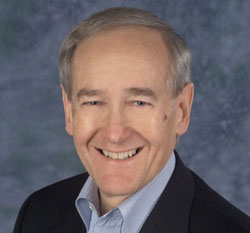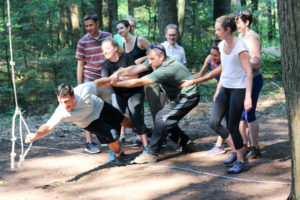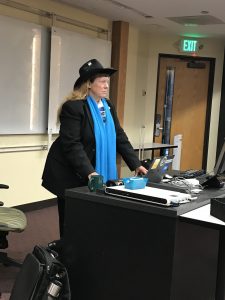This post was written by Andria Denome ’18
“Whatever lazy or narcissistic things you’ve been hearing about today’s Millennials, that’s not Andria” is what Jocelyn said in her introduction of me to Dennis DeLeo.
 Dennis, affectionately known throughout Rochester, NY as Denny, is the co-founder of Trillium Group Venture Capital and Private Equity and more recently of the Venture Jobs Foundation. Trillium was the first VC firm in Rochester, born after Denny and a Kodak colleague saw an unmet need. Venture Jobs Foundation (VJF) emerged in a similar way after Denny saw that the poorest neighborhoods in Rochester were teeming with the entrepreneurial spirit to revitalize the community but they lacked capital. VJF is an impact investing organization with the mission of bringing jobs and resources to low income neighborhoods via small business.
Dennis, affectionately known throughout Rochester, NY as Denny, is the co-founder of Trillium Group Venture Capital and Private Equity and more recently of the Venture Jobs Foundation. Trillium was the first VC firm in Rochester, born after Denny and a Kodak colleague saw an unmet need. Venture Jobs Foundation (VJF) emerged in a similar way after Denny saw that the poorest neighborhoods in Rochester were teeming with the entrepreneurial spirit to revitalize the community but they lacked capital. VJF is an impact investing organization with the mission of bringing jobs and resources to low income neighborhoods via small business.
I read about Denny in several articles and I knew that it would be amazing to learn more about his career and leadership path. Plus, conducting informational interviews is a requirement for The Sustainable Innovation MBA Career Launch curriculum and I had a looming deadline.
Although we are constantly barraged with pro-networking encouragement at the Grossman School of Business, I struggle to conceptualize its impact. Coming into the program directly out of undergraduate studies, I have never really been in the job market with that extra level of pressure. What’s even harder is asking my mom to connect me with her friend, Jocelyn, to connect me with a very accomplished VC that she went to Harvard with decades ago, with whom she may or may not keep in touch, just for the opportunity to chat, on the outside-chance he would be willing to share his hard-won experience.
I was skeptical, but that is exactly what I did. The result was a flood of support, advice and praise. Jocelyn’s warm introduction really tipped the scales in my favor, as Denny said, “I know Jocelyn very well and I know she would not send a student my way if they weren’t promising.” I have a new appreciation for networking and the utilization of my close network.
Below are some of the key points from my conversation with Denny.
- Were did vision for VJF come from? What is the Foundation working on now?
VJF is only five years old but they are already added many programs to boost the Rochester economy, specifically in disadvantaged neighborhoods. They have created two programs to plant and nurture the seeds of entrepreneurship earlier than the micro-lending level via a pipeline program. First, they created Jobs Kitchen which is a business accelerator program that local entrepreneurs can apply to join. From there Denny and his team thought, “what else can we do to jumpstart entrepreneurship?” and the answer was Jobs Kitchen Academy. Jobs Kitchen Academy is a program to teach teens in about entrepreneurship with hands on learning, unique curriculum, and local leaders. The Academy is a supplement to their school work and won’t have homework so it will be manageable for teens already balancing school, a job, and/or sports.
- What advice do you have for someone looking to explore a career entrepreneurial impact investing?
Denny recommended devoting one to three years to working in startups. When you’re young there is a much lower risk because you have fewer financial obligations. Don’t be afraid to fail but be prepared to rebound quickly.
We then side-stepped into the topic of general early-career advice: Build your reputation carefully, early, and with supervisors of influence. Whenever given the chance, express yourself clearly and articulate and demonstrate your skillset. Also, it is very important take initiative and always deliver more than asked for. However, beware of the pitfall of becoming a lone wolf, nobody likes a know-it-all that keeps their team in the dark to make themselves look better. Use your team to do more and become a leader in the process.
- What are some of practices you have that you think make you an effective leader?
Denny does well delegating and challenging his employees. He explained that it is not productive to belittle them by over-explaining, if they have questions they will ask. Denny also works everyday to be approachable, available around the office, and actively building relationships by listening and showing compassion.



 This article was written by
This article was written by 

 Ms. Lovins first came to prominence as one of the co-authors of the book
Ms. Lovins first came to prominence as one of the co-authors of the book  The Summit was sponsored by the
The Summit was sponsored by the  The leading emerging and frontier markets investment manager hosted two students in a practicum project to gain hands on experience with investing in emerging and frontier markets. The students, Mike Rama and Ted Carrick, worked closely with Ole Jørgensen, Global Evolution’s Research Director, at headquarters in Denmark. Together, they developed recommendations to enhance Global Evolution’s ESG model and offering in North America, where the company is currently expanding.
The leading emerging and frontier markets investment manager hosted two students in a practicum project to gain hands on experience with investing in emerging and frontier markets. The students, Mike Rama and Ted Carrick, worked closely with Ole Jørgensen, Global Evolution’s Research Director, at headquarters in Denmark. Together, they developed recommendations to enhance Global Evolution’s ESG model and offering in North America, where the company is currently expanding. In 2008, when MIT Sloan Management Review and the Boston Consulting Group began their sustainability research program, it was the start of the Great Recession, and pundits were predicting the end of sustainability on the assumption that executives would turn away from corporate social responsibility initiatives in favor of “making money.”
In 2008, when MIT Sloan Management Review and the Boston Consulting Group began their sustainability research program, it was the start of the Great Recession, and pundits were predicting the end of sustainability on the assumption that executives would turn away from corporate social responsibility initiatives in favor of “making money.” This post was written by
This post was written by